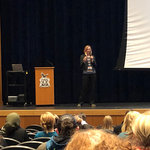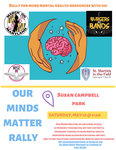 Severna Park
Severna ParkOvercast, 57°
Wind: 8.1 mph, N
 Severna Park
Severna Park



Depending on whom you talk to, mental health can be a tricky subject. Maybe you’re a student who’s afraid to ask about it because it’s taboo. Maybe you’re a parent who thinks of mental illness as a chemical imbalance, something that you can’t control and something that could never affect your child. Or maybe you’re an educator or a youth leader who knows a teenager in need and just doesn’t know how to help.
But members of the Severna Park community are looking to change the way people look at mental health. This May – which also happens to be Mental Health Month, a nationwide observance started by Mental Health America in 1949 – a group of students from Severna Park High School is launching Our Minds Matter with two events to raise awareness of the problems they and their peers face.
“We want more funding in public schools focused on mental health, more training for teachers, and more counselors available,” explained Katrina Schultz, who is leading the movement with classmates Parker Cross, Lauren Carlson, Megan Moulsdale and Sabina Khan. “We believe that mental health in our community must be de-stigmatized.”
Our Minds Matter launched with a march on May 1 before the start of the school day, when students walked from St. Martin’s in-the-Field to Severna Park High School to raise awareness of mental health problems among students in the community. Up next on the calendar is a rally in Annapolis on Saturday, May 18, from 11:00am to noon at Susan Campbell Park. Schultz said the rally will be followed by two workshops, one for students and young adults and another for parents and adults.
“De-stigmatizing mental health will be a long, drawn-out process, but we’re trying to start a conversation in our community,” Khan said.
Culture Is Hard To See
Mental illness isn’t unique to Severna Park. It can affect any community of any demographic in any geographical location, but culture plays a role in how mental illness manifests itself.
“In the United States, we focus on mental health being tied to a biological, genetic or psychological condition, and we focus way less on the ways our social relationships and community culture have an effect on mental health,” observed Dr. Anna Mueller, assistant professor within the Department of Comparative Human Development at the University of Chicago, who recently spoke at Severna Park High School’s “What If We Put Mental Health First: Now What?” presentation. “If you don’t address the root cause, it doesn’t matter if you teach coping skills because you’re putting young people in a world where they have to cope, cope, cope.”
Changing the culture has been a mission for such Severna Park-based organizations as Ellie’s Bus, which aims to de-stigmatize mental illness; Burgers & Bands for Suicide Prevention, which helps fund mental health initiatives in local communities; and Parenting for a Different World, which wants to shift the dialogue about priorities and achievement to attain greater balance in the physical, intellectual, social, and emotional development of young people.
“Mental health isn’t just a chemical imbalance,” explained Nancy Lincoln Reynolds, associate pastor at Woods Memorial Presbyterian Church and a licensed psychotherapist who works with Parenting for a Different World. “Mental health has to do with life experiences, family culture, community culture.” She urges people not to look at mental health in a vacuum but instead within the context of a person’s family, community and school. “There’s a high level of pressure these kids experience that has an effect on their emotional wellbeing,” she said.
For an example, one need look no further than a 2016 study Mueller undertook with fellow sociologist Dr. Seth Abrutyn of the University of Memphis. In “Adolescents under Pressure: A New Durkheimian Framework for Understanding Adolescent Suicide in a Cohesive Community,” Mueller and Abrutyn explore what they found when they talked with 71 people who lost loved ones to suicide, as well as focus groups, mental health professionals and school personnel, all from an anonymous community that, for the sake of privacy, the study refers to as Poplar Grove.
Between 2000 and 2015, Poplar Grove suffered 19 suicides, all of which “were current students or recent graduates of Poplar Grove High School
(PGHS), the only public high school in the community,” according to the study. It goes on to describe Poplar Grove High School as “a large school with approximately 2,000 students” and one that “is widely recognized for its high-achieving student body.”
As Mueller pointed out, “Culture is hard to see.” Without even realizing it, many Poplar Grove residents set expectations for the community’s youth to fit a certain image: playing varsity sports (ideally with a state championship or two), getting into an elite college (on a merit or athletic scholarship), and eventually moving back to Poplar Grove to buy an expensive home. As one youth in Mueller’s study described it, students were held to a standard with “everything being perfect: good grades, good kids, who go to good colleges.”
The problem is exacerbated by a stigma around mental illness, so, as the study says, “help-seeking behaviors are often suppressed.”
Finding Solutions
Following her presentation in Severna Park, Mueller took the opportunity for one-on-one interaction with parents and students, and she found that many people wanted to point a finger of blame for the mental health crises the community recently suffered. “That’s not productive,” Mueller said. “The only way to stop it is to own the fact that we each play a part in youth suicide and prevention. If you expect other organizations to take a look at themselves, you can’t do that without looking at yourself.”
As for our community, in addition to alleviating the pressure, Severna Park culture needs to start empowering youth to be resilient. Lincoln Reynolds explained that Parenting for a Different World has emphasized that parents who shield their children from hardship can end up doing more harm than good. “Kids in our community lack coping and resilience,” she said. “They’re not good at recovering from difficult circumstances. Parents have to let them fail, let them make mistakes and learn from them.”
She explained further, saying, “If I have never had an experience of having to suffer the consequences of my actions because parents or teachers come in to fix everything, when I am faced with a problem, I don’t have the skills to be resilient and bounce back. I can’t handle it. Resilience is bouncing back from difficulty, and if you never run into difficulty, you never learn to bounce back.”
Making Mental Health Resources Accessible
The most accessible place for students seeking mental health resources is the place where they spend most of their waking hours – their school. Counselors within Anne Arundel County Public Schools work with students on a variety of items in three domains: personal/social, academic and career/post-secondary planning.
“On any given day, this can range from counseling a student in emotional crisis, practicing healthy coping skills, assisting with getting help from teachers, coaching study skills, writing letters of recommendations on behalf of students, or discussing the best college or career fit,” said Lindsay Brown, who chairs the counseling center at Severna Park High.
Each counselor at SPHS serves about 400 students, and the school also has a full-time psychologist on staff. “Our school psychologist works with students who have counseling-related goals on their IEPs, conducts psychological testing, and provides crisis counseling for the general education public when needed,” Brown added.
Counselors, however, are not therapists and cannot provide long-term therapy or diagnose mental health issues. They are simply available to help in the short term. “School counselors are solution-focused and we aim to try to remove whatever barriers are impeding the success of our students at any given time,” Brown said. “School counselors will refer families to outside counseling as well if a student is in need of more support.”
Anne Arundel County Public Schools is making an effort to increase resources for students, specifically by bringing more school counselors and psychologists on staff. Even though Severna Park High School’s student-to-counselor ratio of 400:1 exceeds the American School Counselors Association’s recommendation of 250:1, it is still better than some schools where there is only one counselor for 700 students.
“We do understand the great need,” said Dana Schallheim, who represents District 5 on the Board of Education. “Kids are coming to our schools a lot more traumatized. We are working on it and doing what we can while being realistic regarding funding. We need to be supportive of our students and do the best we can to provide a safe and healthy learning environment for them so they can be successful.”
This year, the BOE asked the county for funding to increase the number of guidance counselors, social workers, psychologists and pupil personnel workers. “They’re critically needed positions,” said Terry Gilleland, the president of the board. However, he acknowledged that providing all the necessary resources isn’t something that can happen automatically. “This is a multiyear approach,” he said. “This is not going to be fixed in one budget cycle.”
Gilleland added that he is encouraged to see so many students and parents coming forward to talk about the need for mental health resources. “They need to continue with these conversations,” he said. “It’s in those conversations that I think we’ll see discoveries that will provide us opportunities to learn, to grow and to provide better supports where we can.”
READ MORE:
Suicide Prevention And Awareness In Severna Park
Anne Arundel's Crisis Response Is Here To Help
Let’s Talk: Suicide Prevention And Awareness
The Pressure Is Real: Severna Park’s Struggle To Be Perfect Is A Big Part Of The Suicide Epidemic
STAR Program Brings Dr. Anna Mueller To Severna Park
Letter To The Editor: In Response To “The Pressure Is Real”
Talk Saves Lives – What’s That?
Students And Parents Push For Culture Shift To End Severna Park’s Suicide Problem
Comments
No comments on this item Please log in to comment by clicking here